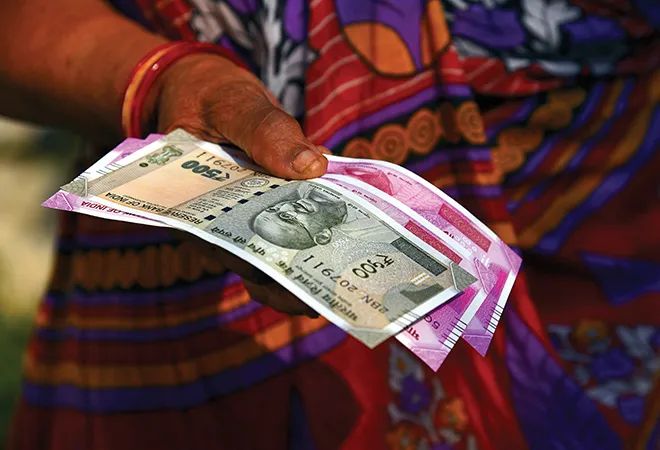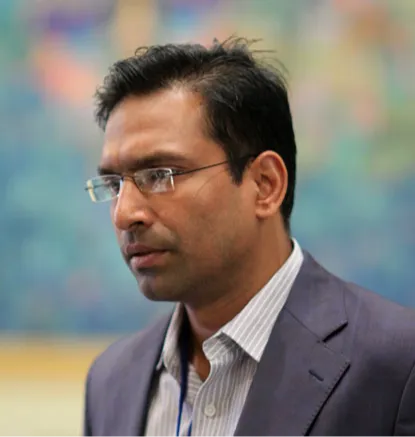-
CENTRES
Progammes & Centres
Location
While the jury is yet to be out globally on the UBI, it has many takers in India.

Image Source: Anand Purohit/Getty
With the next General Elections only months away, political parties in India are scrambling for innovative and attractive schemes to woo voters. The list of promises goes like this — direct cash transfers, loan waivers, direct per-acre subsidy for farmers, minimum guaranteed income, universal basic income. The flavour of the season seems to be the idea of Universal Basic Income (UBI). The UBI idea has taken a huge traction in recent months, especially after the Telangana government reaped the electoral dividend in the recent Assembly polls. Many analysts link the Telangana Rashtra Samithi (TRS) party’s landslide victory to the successful implementation of popular Rythu Bandhu scheme that offered income support to farmers. The electoral success of the TRS is now pushing many other States to come out with their versions of the UBI. Recently, the Odisha government unveiled ‘KALIA’, a version of the UBI that assures guaranteed income support to farmers.
At the national level, a major push for the UBI has come from the opposition Congress Party. To soar up the party’s fortunes among the rural population, especially farmers and daily wage labourers, Congress president Rahul Gandhi promised the idea of minimum income guarantee to the poor. The National Democratic Alliance government under the leadership of Prime Minister Narendra Modi seems to be getting ready with its electoral ammunition. Speculation is rife that the North Block may come up with some form of UBI as a pre-election bonanza for farmers and informal sector workers.
For quite some time now, the idea of UBI has taken the world by storm. The bigwigs of Silicon Valley and Europe’s social democrats are in the forefront of its advocacy. For instance, venture capitalist Marc Andreessen, web guru Tim O’Reilly and several other bigwigs of Silicon Valley are now supporting something called “social vaccine of the 21st century.” Influential incubator Y Combinator is running its own basic income experiment with a pilot study of 100 families in Oakland, California, to see how it goes. UBI is among few welfare programmes which is gaining support across political spectrum — from socialists to libertarians.
In fact, some countries in the Western Europe and Northern America are currently piloting with the UBI concept. For instance, Finland and Netherlands have begun to cover unemployed individuals with a monthly transfer. Recently, the Canada government said it would experiment with the concept in certain regions facing economic shocks.
Influential incubator Y Combinator is running its own basic income experiment with a pilot study of 100 families in Oakland, California, to see how it goes. UBI is among few welfare programmes which is gaining support across political spectrum — from socialists to libertarians.
Fed up with the effectiveness of traditional anti-poverty programmes, wasteful subsidies and gross incompetency of welfare bureaucracies, many prominent economists are now advocating for a universal basic income to address frequent income shocks, job losses and other such periodic challenges that can overwhelm individuals who are without social security. For them, UBI is a citizen’s unconditional and universal right to have basic income to meet his/her needs. They further claim that poverty and vulnerability of the poor, such as farmers and informal and low skilled workers, can be addressed very effectively by transferring a guaranteed minimum income.
The proponents of the scheme argue that unlike the in-kind transfers which treat them as ‘objects’, unconditional cash transfer would make them as ‘agents’ as it would entrust them with responsibility to spend their money more effectively. This is one way of passing the onus to individuals than the state and its bureaucracy controlling these development processes which often produce bizarre outcomes. Further, a basic and guaranteed income that covers everyone (thereby eliminating the exclusion error commonly found in welfare programmes) can act as a safety net against sudden job losses, income shocks and health issues that can impact an unsecured citizen.
The idea of UBI is gaining rapid traction among economists from the global south. The idea seems to be gaining traction in India too for quite some time, especially as the country is ready with Jan Dhan, Aadhaar and mobile system or JAM trinity for direct benefit transfers and income transfer trials. The UBI concept found a prominent place in the Union Finance Ministry’s 2016-17 Economic Survey that made a strong pitch for transferring benefits directly in to Aadhaar-linked accounts of specific individuals. The key author of the idea was the then Chief Economic Advisor Arvind Subramanian.
The UBI concept found a prominent place in the Union Finance Ministry’s 2016-17 Economic Survey that made a strong pitch for transferring benefits directly in to Aadhaar-linked accounts of specific individuals.
Recently, Subramanian and his colleagues have come out with a proposal called quasi-universal basic rural income or QUBRI for farmers. They have proposed that it is feasible to transfer Rs. 18,000 per year to each rural household, except those which are “demonstrably well-off”, at an estimated cost of Rs. 2.64 lakh crore to tackle the agrarian distress among others. According to them, the fiscal burden under the scheme should be shared between the Centre and State governments in equal measure. With this proposal coming days ahead of the interim budget, the idea seems to have opened the political space in India.
Yet, not everyone is sure how the scheme would turn out. Subramanian himself has accepted that there are no evidence yet to show how it would work, particularly whether the scheme would kill the incentive to work. However, he is emphatic that if implanted effectively, a quasi-universal basic income scheme would be a far more effective tool to tackle the agrarian distress than the minimum support price (MSP) and loan waivers.
The bigger question, however, is the fiscal capacity to implement such gargantuan scheme. Going by the estimation of Subramanian and his colleagues, India would require Rs. 2.64 lakh crores (at 2019-20 price) or 1.3% of the GDP to cover 75% of the rural population. With India already crossing the red lines of fiscal deficit, where from the money would come for such a scheme.
The bigger question, however, is the fiscal capacity to implement such gargantuan scheme.
However, it may be still feasible to have the scheme by merging some of the existing welfare schemes. Yet, roll back of the existing welfare schemes for the UBI is not that easy. The best proof is the Mahatma Gandhi National Rural Employment Guarantee Act (MGNREGA). Prime Minister Narendra Modi who once dubbed the job scheme as “living monument of UPA’s failures” not only could not scrap the mega scheme, but instead his government last year had to allocate more money for its continuation. In short, once implemented, competitive politics will ensure the continuation of schemes like UBI, notwithstanding their effectiveness. What is more worrisome is, to improve their electoral fortunes over their rivals, political leaderships of all parties will do everything to push the amount of UBI further at the risk of fiscal imbalance.
Further, UBI has potentials to create labour market distortions. Such guaranteed income without any regular work would affect labour mobility as seen in the case of MGNREGA, which in many ways can push the wages impacting farm sector and even factory works.
Finally, given these transfers are unconditional, it is extremely difficult to ensure that the additional income will be spent by the recipients on health, education and other human development needs. As the experience from other cash transfer programmes shows, additional income may be spent on tobacco, alcohol and other such conspicuous consumptions.
To sum up, while the jury is yet to be out globally on the UBI, it has many takers in India. The country’s persistent agrarian crisis and the falling rural income is pushing many to jump with this new idea. While a prominent section of intelligentsia, including former chief economic advisor Arvind Subramanian is making a strong pitch for it, one might see some avatar of the UBI finding its space in the Centre’s upcoming interim budget. Yet, with little knowledge about its effectiveness (even Silicon Valley pilots are not yet out!), the government and policy makers need to take a cautious approach on this new idea. This is because, once implemented, a scheme of this nature would be impossible to roll back.
The views expressed above belong to the author(s). ORF research and analyses now available on Telegram! Click here to access our curated content — blogs, longforms and interviews.

Niranjan Sahoo, PhD, is a Senior Fellow with ORF’s Governance and Politics Initiative. With years of expertise in governance and public policy, he now anchors ...
Read More +